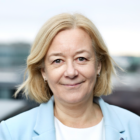A new role for the EFC
Congratulations EFC on celebrating 30 years of fruitful networking and peer-learning! As a relative newcomer to the philanthropic sector, I already feel welcome: through an inspiring first meeting with Gerry Salole earlier this year, followed by the impressive the annual conference in Paris in May.
After three successful decades, it is now time to look ahead. What can EFC provide for our sector in the future? Apart from the obvious – learning from each other, sharing good practices, making useful contacts for bilateral collaboration, I think that there is a real and increasing argument for shared platforms. We need to be able to speak in a joint capacity to tackle the challenges ahead and to enable change. Our members work in different fields of philanthropy, but we all benefit from the advocacy that EFC can provide.
In the specific area in which Riksbankens Jubileumsfond does most of its funding, academic research, this need for advocacy has taken on a particular urgency in recent times. The academic world used to be a respected participant in public discourse. Politicians, policy-makers and the wider public listened to results and analyses from scholars active in different fields of academia. Scientific research helped foster a rational and measured public debate. But this has now changed. The belief in “experts” is questioned and the public debate is increasingly dominated by personally held opinions and emotions. Of course we must applaud public engagement, and the “ivory tower”- tendencies of some scholars has been a contributing factor in this problematic trend. But the distrust and deliberate ignorance has accelerated. I am worried that future generations will simply lose trust in the scientific process, and with it, the ability to address the great challenges of society.
Here is where I see EFC as an important voice, speaking on behalf of the foundations that are advancing scientific knowledge. During the EU Research and Innovation Days in September 2019, the EFC did play a new role in the conversation on how scientific research can shape future policy. Foundations of course represent substantial funding resources, resources that the EU would like to incorporate in its own strategic plans. But in the newly formed Commission, research seems to play a less prominent role than before. The new Commissioner’s portfolio is targeting “Innovation and Youth”, and somewhere under that heading scientific research is to be found. The new EU research framework Horizon Europe is now being formed, and the EFC led discussions on how our foundations can participate in that development. These discussions will continue, and thus EFC intervention in the EU research policy planning will continue to have an effect.
I think this signals the beginning of a new role for the EFC. Advocating the importance of philanthropy in a world that is rapidly changing – not always for the better – is one way of using us a collective entity, as a group speaking through one clear voice: the European Foundation Centre.
Authors

CEO, Riksbankens Jubileumsfond